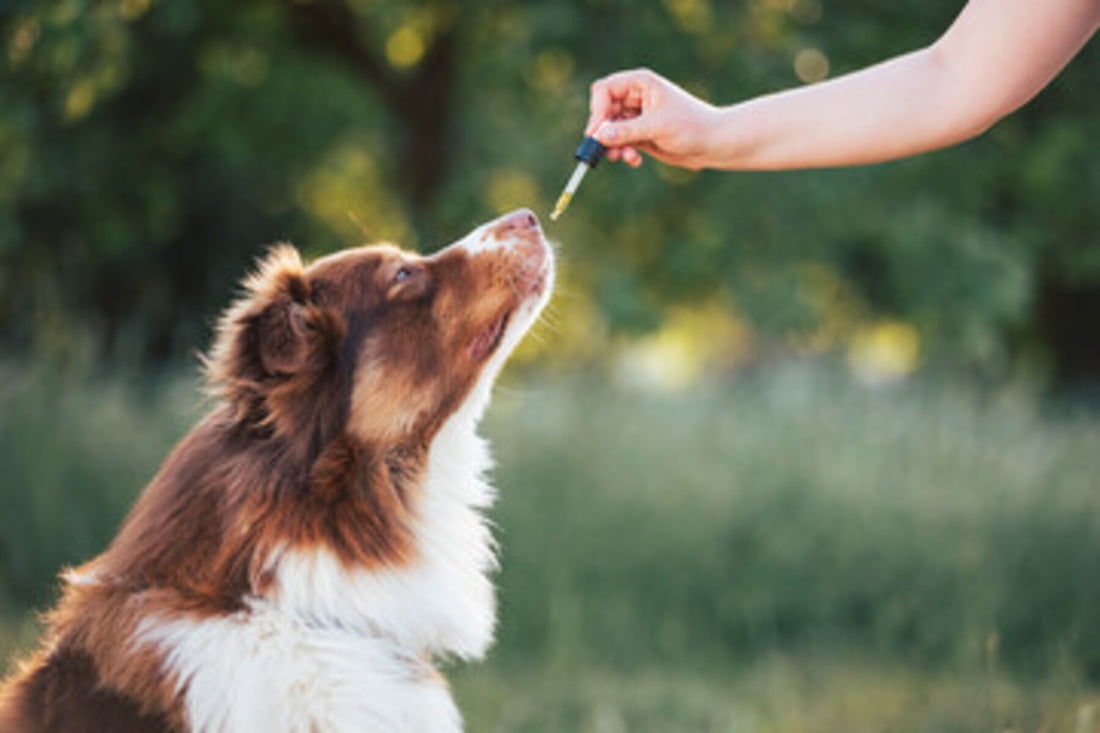Choosing the Right Multi Vitamins for Dogs’ Health and Well-being

Ensuring your dog gets every essential nutrient can be a balancing act. As many pet owners turn to homemade diets, the importance of multivitamins becomes paramount to maintain optimal health.
In this article, we’ll cover all you need to know about dog vitamins. We’ll not only reveal the secrets behind the best multivitamins but also gives you invaluable insights into their role in your dog’s diet.
The Role of Multivitamins in a Dog’s Diet
Just as humans require vitamins for various bodily functions, so do our canine companions. But not all nutrients are created equal. There are essential nutrients, like certain amino acids and fatty acids, which dogs must obtain from their diet. Then there are non-essential ones, which their bodies can produce on their own.
Multivitamins play a pivotal role in bridging the nutritional gaps. They boost your dog’s immunity, support robust growth, and promote their overall well-being, especially when they might not be getting a balanced diet.
Homemade Diets: Pros, Cons, and Nutritional Gaps
The trend of whipping up homemade meals for dogs has surged in popularity, and for good reasons. You have control over ingredients, ensuring freshness and quality, and can easily skip on preservatives and additives present in commercial dog food.
However, there’s a flip side. Such diets can sometimes be inconsistent and might miss out on certain essential nutrients. There’s a risk of nutritional imbalances, making it crucial to choose the best multivitamin for dogs on a homemade diet to fill these gaps effectively.
Key Ingredients to Look for in Dog Multivitamins
Navigating the world of pet supplements can be overwhelming with a plethora of options available. Knowing what ingredients are essential in a multivitamin can simplify your decision-making. Here’s a breakdown of the essential components to keep an eye out for:
Vitamins
These are vital organic compounds that support numerous bodily functions.
- Vitamin A: Essential for vision, growth, and immune function.
- B-complex: Includes several vitamins like B1, B2, B6, and B12. They play a critical role in energy production and the formation of red blood cells.
- Vitamin C: While dogs produce this naturally, additional supplementation can support the immune system.
- Vitamin D: Crucial for bone health as it aids calcium absorption.
- Vitamin E: An antioxidant that supports skin health and counters oxidative stress.
- Vitamin K: Aids in blood clotting and bone metabolism.
Minerals
Just like vitamins, minerals are needed in small amounts, but their role is indispensable.
- Calcium: Beyond bone health, it plays a role in muscle function and nerve signaling.
- Magnesium: Supports nerve function, muscle movements, and boosts the immune system.
- Zinc: Vital for DNA synthesis, wound healing, and a robust immune system.
- Iron: Essential for producing hemoglobin, which carries oxygen in the blood.
Omega fatty acids
Omega-3 and Omega-6 fatty acids are essential for maintaining a lustrous coat and healthy skin. They also offer anti-inflammatory properties, which can benefit dogs with allergies or joint issues.
Probiotics
With gut health being a cornerstone of overall well-being, probiotics ensure digestive health by promoting beneficial bacteria in the gut.
Understanding these ingredients is only half the battle. The other half is discerning which ones your dog specifically needs based on their unique dietary and health requirements.
Specific Needs Based on Age, Breed, and Health Conditions
Every dog is unique. Whether it’s their age, breed, or health status, each factor influences their dietary requirements. When choosing multivitamin supplements, it’s crucial to consider these aspects to ensure optimal health for your furry friend.
Dog’s Life Stage: Puppies vs. Adults vs. Senior Dogs
- Puppies: They’re rapidly growing, demanding more vitamins and minerals for proper bone and muscle development. A multivitamin rich in calcium, phosphorus, and DHA (a type of Omega-3) can be beneficial.
- Adult Dogs: Their nutritional needs stabilize. Still, a balanced multivitamin can aid in maintaining overall health, immune support, and energy levels.
- Senior Dogs: Age brings about a decline in certain body functions. Multivitamins with antioxidants like vitamins C and E can combat age-related oxidative stress. Additionally, supplements with glucosamine and chondroitin support joint health.
Breed-Specific Needs
Large breeds might benefit from supplements supporting joint health, considering their susceptibility to hip dysplasia and arthritis.
Smaller breeds, often with dental issues, could benefit from vitamins that support oral health. Breeds with long coats might require Omega fatty acids for maintaining coat shine and health.
Health Conditions
- Allergies: If your dog has skin allergies, Omega-3 supplements can offer anti-inflammatory benefits.
- Joint Issues: Supplements with glucosamine, chondroitin, and MSM can help support joint function and mobility.
- Digestive Concerns: A multivitamin with added probiotics and fiber can aid in gut health and digestion.
Your dog’s individuality extends beyond their personality. Recognizing their specific nutritional needs ensures they not only live a full life but a healthy one. Before making any significant dietary changes or introducing new supplements, it’s always wise to consult with your veterinarian. They can provide tailored advice suited for your pet’s unique requirements.
The Rise of Specialty Multivitamins
With the growing awareness of pet health, the market has seen an influx of specialty multivitamins, tailored to address specific areas of a dog’s well-being. From cognitive function to lustrous coats, these targeted supplements provide enhanced support beyond the standard multivitamin.
Multivitamins for Specific Purposes
- Joint Health: These typically contain ingredients like glucosamine, chondroitin, and MSM. They aim to boost joint mobility, reduce inflammation, and provide pain relief for conditions like arthritis.
- Coat and Skin: Omega fatty acids, primarily Omega-3 and Omega-6, dominate these supplements. They focus on promoting a shiny coat, reducing skin allergies, and maintaining skin moisture.
- Cognitive Function: Especially beneficial for senior dogs, these supplements might contain antioxidants and ingredients like phosphatidylserine to support brain health and delay cognitive decline.
Deciding on Specialty Multivitamins
Start by evaluating your dog’s specific needs. Does your senior dog show signs of memory loss? Is your dog’s coat losing its shine? Identifying the primary concern can help you choose the right supplement.
Always check the label for any additives or filler ingredients. A good specialty multivitamin should prioritize active ingredients without unnecessary fillers.
It’s important to remember that while specialty multivitamins can provide added benefits, they should be a part of a comprehensive health plan. Before integrating them into your dog’s diet, seek guidance from your veterinarian to ensure they complement your pet’s overall nutritional and health goals.
Tips for Introducing Multivitamins to Your Dog’s Diet
When considering adding a new element to your dog’s dietary routine, it’s crucial to ensure a smooth transition. Multivitamins can be a game-changer for your pet’s health, but it’s essential to introduce them wisely to get the most out of their benefits and avoid potential pitfalls.
Starting Slow and Monitoring
Begin with a dose lower than the recommended amount. This allows your dog’s system to acclimate to the new supplement.
Keep an eye out for any changes in behavior, appetite, or any signs of allergies. If you notice adverse reactions, consult your veterinarian immediately.
Mixing with Food and Treats
Most dogs can be a bit picky when introduced to a new taste. To make the process easier, mix the multivitamin with their regular food. Liquid supplements can be drizzled over kibble, while chewable tablets can be disguised inside treats or soft food.
Ensure the supplement is mixed well, so your dog doesn’t miss out on the multivitamin while avoiding parts of their meal.
Consistency is Key
Just like human supplements, consistency ensures that your dog reaps the full benefits of the multivitamin. Set a specific time each day for the supplement, creating a routine your dog can anticipate.
Use reminders or alarms if necessary to ensure you don’t miss a dose.
Remember, every dog is unique. While many can easily adjust to new additions to their diet, some might require a bit more patience and care. When in doubt, always prioritize your dog’s comfort and safety and seek advice from professionals who know your dog’s health best.
How to Choose the Best Dog Vitamins
As with any product, not all multivitamins are created equal. When it comes to your furry friend’s health, ensuring you’re choosing a high-quality supplement from a trustworthy brand is of utmost importance. Here’s a guide to help you make an informed choice:
Certifications and Quality Control
Ensure the brand adheres to good manufacturing practices (GMP) and has relevant certifications that indicate their commitment to quality. This ensures that the product you’re buying has been produced under rigorous standards.
Many reputable brands will offer a guarantee of potency and purity, showcasing their confidence in the product’s quality.
Customer Reviews and Veterinarian Recommendations
One of the most genuine indicators of product efficacy is the experience of other dog owners. Browse online reviews to get a sense of the product’s effectiveness and any potential side effects.
Your veterinarian is an invaluable resource. Their recommendation can be especially helpful since they have firsthand knowledge of products that have worked for other dogs with similar health profiles.
Third-party Testing
Independent third-party testing ensures that the product contains what it claims and doesn’t contain harmful elements like contaminants or fillers.
Brands that are transparent about their third-party testing results demonstrate a commitment to quality and trustworthiness.
Selecting the right multivitamin is a combination of research and understanding your dog’s specific needs. It’s worth the effort to ensure you’re giving your dog the best possible product to enhance their health and longevity. Remember, the best multivitamin for your dog is one that complements their unique dietary and health requirements.
Shop Vitamins and Supplements for your Dog at Bando Pets
Ensuring your dog’s optimal health goes beyond just a balanced diet. Multivitamins play a pivotal role in filling nutritional gaps and catering to specific health needs. From understanding the importance of multivitamins in a dog’s diet to recognizing the unique requirements based on age, breed, and health conditions, this guide has aimed to provide you with comprehensive insights to make an informed choice.
Bando is committed to your pet’s well-being. With our array of quality care products and supplements, we strive to provide only the best for your furry family members. As you seek the ideal multivitamin for your dog, remember that consistency is key to seeing tangible health benefits. Browse our catalog of supplements and care products tailored for pets. If you need guidance or have questions, our dedicated team is always here to assist you. Remember, a healthy dog is a happy dog!






